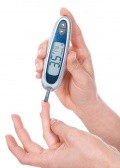Hypoglycemia
Hypoglycemia occurs when blood sugar (glucose) levels become too low. Low glucose levels are considered below 70 mg/dL [1] Hypoglycemia can be divided into two categories: reactive hypoglycemia (most common) and fasting hypoglycemia [2].
|
Hypoglycemia | |
| Causes | Dietary Factors, Genetics |
|---|---|
| See Also | Endocrine Conditions, Mental/Emotional or Psychological Conditions, Premenstrual Syndrome, Migraine Headache, Atherosclerosis, Intermittent claudication, Angina, Metabolic Syndrome |
| Books | Books on Endocrine Diseases |
| Articles | Articles on Endocrine Conditions |
Contents
Naturopathic Assessment
Causal Factors
In order to stimulate the innate ability of the body to heal the causes of disease must be identified and addressed. Hypoglycemia is primarily due to dietary factors but there are also factors that need to be considered.
Lifestyle
- Irregular eating patterns and missing meals are the primary cause or trigger for hypoglycemia.[3]
- Alcohol consumption causes reactive hypoglycemia by stressing blood sugar control. Long-term alcohol use causes hyperglycemia and Type II Diabetes.[2]
Social
- Family dynamics
- Fear or anxiety of hypoglycemia is common when a family member is diagnosed with diabetes, especially type 1 diabetes early in life.
Medical Interventions
- Prescription Medications
- Several drugs increase the risk for hypoglycemia including: Chlorpropamide, Glipizide, Glibenclamide, Glyburide, Tolazamide, Tolbutamide, Metformin, Thiazolidinediones: pioglitazone, rosiglitazone, Acarbose, Glimepiride, Gliclazide, Nateglinide, Repalinide.
- A common cause of reactive hypoglycemia is taking insulin or diabetic medication at the wrong time or taking too much.
Diagnostic Testing
In cases of diabetes or hypoglycemia, daily home monitoring of blood sugar levels is advised.
- Typically tests include fasting plasma glucose and random plasma glucose.
Related Symptoms and Conditions
Hypoglycemia is associated with a number of other conditions such as: [2]:
- Mental/Emotional or Psychological Conditions Since the brain is dependent on glucose as its energy source, hypoglycemia (decreased blood glucose) is implicated in many psychological disorders.
- Aggressive and criminal behaviour Hypoglycemia is common in psychiatric patients and criminals. Diets restricted in sugar have been demonstrated to decrease antisocial behaviour especially in males.
- Premenstrual Syndrome Reactive hypoglycemia is typically experienced during the 5-10 days before menses.
- Migraine headaches
- Atherosclerosis
- Intermittent claudication
- Angina.
- Metabolic Syndrome (or Syndrome X).
Characteristics
Hypoglycemia occurs when:[1]
- The body's glucose is used up too quickly
- Glucose is released into the bloodstream too slowly
- Too much insulin is released into the bloodstream.
Symptoms of hypoglycemia can vary among the following:[2]
- Fatigue
- Hunger
- Headache
- Depression
- Anxiety
- Nervousness
- Irritability
- Rapid heartbeat
- Shaking or trembling
- Tingling of numbness of the skin
- Sleeping difficulties
- Blurred vision
- Excessive sweating
- Mental confusion
- Incoherent speech
- Bizarre or aggressive behavior
If blood sugar drops too low it can result in:
- Fainting
- Convulsions
- Coma
Naturopathic Treatment
The goal of naturopathic treatment is to support and work in tandem with the healing power of the body and to address the causal factors of disease with individual treatment strategies.
It is always advisable to work with a naturopathic doctor before engaging in any treatment plan.
Home Care
Home Care strategies include:
- Monitor blood glucose levels daily, especially if you have diabetes.
- Keep a sugar containing snack or drink with you at all times. When hypoglycemic you typically need about 15 grams of carbohydrates such as:[1]
- 1/2 cup (4 ounces) of fruit juice
- 5 or 6 hard candies
- 1 tablespoon of honey
Lifestyle
Lifestyle recommendations include:
- Eating small meals every 3 to 4 hours often stabilizes the blood sugar. It is important not to skip meals.
- Stabilize blood sugar by modifying the diet. Avoid all simple and processed carbohydrates; emphasize complex-carbohydrate, high fibre foods. Foods with a low glycemic index or glycemic load should be incorporated into the diet.[2]
- Avoid alcohol, especially on its own, and avoid fruit juices and sugary drinks.
- Ensure you drink adequate water.
- Graded exercise program appropriate to the person's fitness level and interest, yet which elevates heart rate at least 60% of maximum for a period of 30 minutes three times a week.[2] Avoid excessive exercise without adequate nutrition or replacement of electrolytes.
Naturopathic Therapies
The prescribing of naturopathic therapies requires the guidance of a naturopathic doctor as it depends on a number of factors including the causal factors, a person's age, prescription medications, other conditions and symptoms and overall health. It is always advisable to work with a naturopathic doctor prior to taking any natural therapies.
Naturopathic Therapies for hypoglycemia include:
- Nutritional Foods include:[4]
- Fruits such as apple
- Herbs such as Bitter melon (Momordica charantia), Gymnema (Gymnema sylvestra), Fenugreek (Trigonella foenum-graecum), Bilberry (Vaccinum myrtillus), Ginkgo (Ginkgo biloba)
- Gemmotherapies such as Olea europaea, Vinca minor
- Classical homeopathics: prescription should be constitutional, and therefore individualized for both true and functional hypoglycemia.[5]
- Hypoglycemia may arise from the following TCM patterns: Liver-Spleen Disharmony, Qi Vacuity & Phlegm Accumulation, Stomach Repletion-Spleen Weakness, Qi & Blood Dual Vacuity. [3]
References
Reviewed by Iva Lloyd, BScH, RPE, ND [1]
- ↑ 1.0 1.1 1.2 PubMed Health (2011) Hypoglycemia. http://www.ncbi.nlm.nih.gov/pubmedhealth/PMH0001423/
- ↑ 2.0 2.1 2.2 2.3 2.4 2.5 2.6 Pizzorno Joseph, Murray Micheal, Joiner-Bey Herb (2007) The Clinician's Handbook of Natural Medicine Churchill Livingstone
- ↑ 3.0 3.1 Flaws B, Sionneau P (2002) The Treatment of Modern Western Diseases with Chinese Medicine: A Textbook and Clinical Manual. Blue Poppy Press.
- ↑ Lu Henry (1986) Chinese System of Food Cures, prevention and remedies Sterling Publishing Co. New York.
- ↑ Locke A (1998) The Family Guide to Homeopathy: The Safe Form of Medicine for the Future. Penguin.
